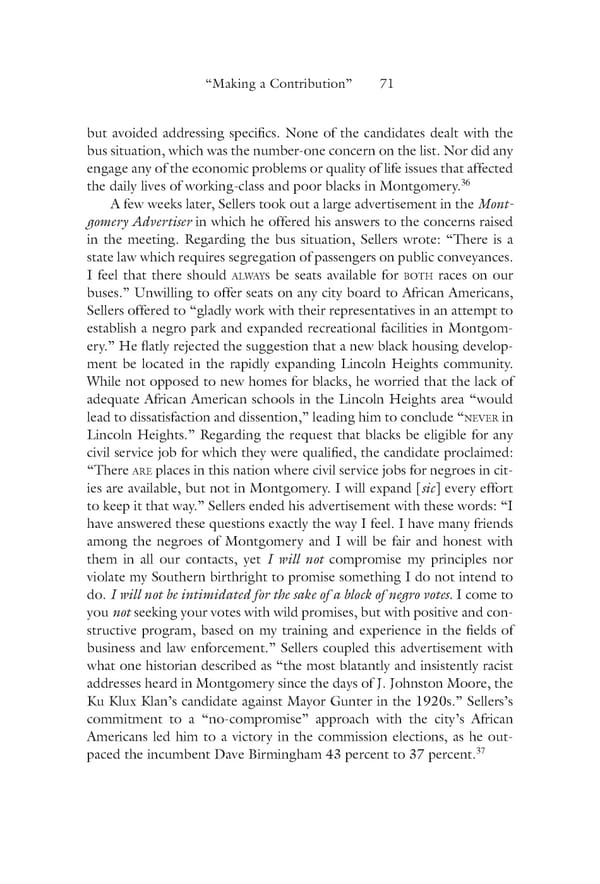“Making a Contribution” 71 but avoided addressing specifics. None of the candidates dealt with the bus situation, which was the number-one concern on the list. Nor did any engage any of the economic problems or quality of life issues that affected 36 the daily lives of working-class and poor blacks in Montgomery. A few weeks later, Sellers took out a large advertisement in the Mont- gomery Advertiser in which he offered his answers to the concerns raised in the meeting. Regarding the bus situation, Sellers wrote: “There is a state law which requires segregation of passengers on public conveyances. I feel that there should always be seats available for Both races on our buses.” Unwilling to offer seats on any city board to African Americans, Sellers offered to “gladly work with their representatives in an attempt to establish a negro park and expanded recreational facilities in Montgom- ery.” He flatly rejected the suggestion that a new black housing develop- ment be located in the rapidly expanding Lincoln Heights community. While not opposed to new homes for blacks, he worried that the lack of adequate African American schools in the Lincoln Heights area “would neveR in lead to dissatisfaction and dissention,” leading him to conclude “ Lincoln Heights.” Regarding the request that blacks be eligible for any civil service job for which they were qualified, the candidate proclaimed: aRe places in this nation where civil service jobs for negroes in cit- “There ies are available, but not in Montgomery. I will expand [sic] every effort to keep it that way.” Sellers ended his advertisement with these words: “I have answered these questions exactly the way I feel. I have many friends among the negroes of Montgomery and I will be fair and honest with them in all our contacts, yet I will not compromise my principles nor violate my Southern birthright to promise something I do not intend to do. I will not be intimidated for the sake of a block of negro votes. I come to you not seeking your votes with wild promises, but with positive and con- structive program, based on my training and experience in the fields of business and law enforcement.” Sellers coupled this advertisement with what one historian described as “the most blatantly and insistently racist addresses heard in Montgomery since the days of J. Johnston Moore, the Ku Klux Klan’s candidate against Mayor Gunter in the 1920s.” Sellers’s commitment to a “no-compromise” approach with the city’s African Americans led him to a victory in the commission elections, as he out- 37 paced the incumbent Dave Birmingham 43 percent to 37 percent.
 Becoming King: Martin Luther King Jr. Page 91 Page 93
Becoming King: Martin Luther King Jr. Page 91 Page 93